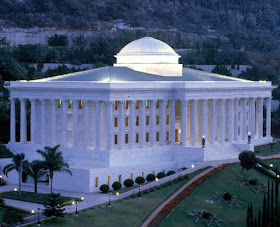And what of the other tribulations which, before and immediately after this dreadful episode, touched Him?
- What of His confinement in the home of one of the kad-khudás of Tihrán
- What of the savage violence with which He was stoned by the angry people in the neighborhood of the village of Níyálá?
- What of His incarceration by the emissaries of the army of the Sháh in Mázindarán, and His receiving the bastinado by order, and in the presence, of the assembled siyyids and mujtahids into whose hands He had been delivered by the civil authorities of Ámul?
- What of the howls of derision and abuse with which a crowd of ruffians subsequently pursued Him?
- What of the monstrous accusation brought against Him by the Imperial household, the Court and the people, when the attempt was made on the life of Náṣiri’d-Dín Sháh?
- What of the infamous outrages, the abuse and ridicule heaped on Him when He was arrested by responsible officers of the government, and conducted from Níyávarán “on foot and in chains, with bared head and bare feet,” and exposed to the fierce rays of the midsummer sun, to the Síyáh-Chál of Ṭihrán?
- What of the avidity with which corrupt officials sacked His house and carried away all His possessions and disposed of His fortune?
- What of the cruel edict that tore Him from the small band of the Báb’s bewildered, hounded, and shepherdless followers, separated Him from His kinsmen and friends, and banished Him, in the depth of winter, despoiled and defamed, to ‘Iráq?
Severe as were these tribulations which succeeded one another with bewildering rapidity as a result of the premeditated attacks and the systematic machinations of the court, the clergy, the government and the people, they were but the prelude to a harrowing and extensive captivity which that edict had formally initiated. Extending over a period of more than forty years, and carrying Him successively to ‘Iráq, Sulaymáníyyih, Constantinople, Adrianople and finally to the penal colony of Akká, this long banishment was at last ended by His death, at the age of over three score years and ten, terminating a captivity which, in its range, its duration and the diversity and severity of its afflictions, is unexampled in the history of previous Dispensations.
- Shoghi Effendi (‘The Promised Day Is Come’)























